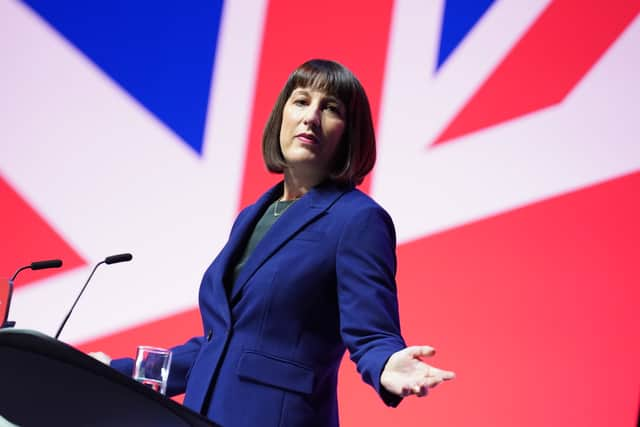Labour party conference: Cautious optimism from green advocates on opposition's climate policy plans
and live on Freeview channel 276
Climate advocates say they are seeing "encouraging" signs from the Labour party on climate and energy policies, after a series of Tory u-turns left many questioning whether the UK could still hit net zero by 2050.
Shadow Chancellor Rachel Reeves spoke today at the party's conference in Liverpool, where she set out the Labour Party’s vision for the British economy if it wins the next general election. She confirmed plans for reforms to the “antiquated” planning system to make it quicker and easier to build the infrastructure needed for modern industries and clean energy networks.
Advertisement
Hide AdAdvertisement
Hide AdLabour would commit to investing £28 billion every year in climate-related measures, Reeves said, and a windfall tax would be levied on the "huge profits" energy giants were making. There would be a crackdown on the use of private planes by minister, she announced, with a jibe at Prime Minister Rishi Sunak - suggesting his love of flying was because he was scared of meeting voters.
Mike Childs, head of policy at Friends of the Earth, said: “By acknowledging just how significant a threat the climate crisis is to our future economy and prosperity, the Shadow Chancellor has opened up some clear, green water between her own party and the Conservatives after the Prime Minister’s recent backtracking.


“If the UK is to stay competitive in the global race for future investment, then the Labour Party must stand firm on its commitment to invest at least £28bn a year on greening and future-proofing industry, rolling out a national programme of insulation across the country, and getting public transport working again," he added.
“Labour must promise that the Treasury under its leadership will be the greenest ever, and not a blocker to progress as it has been in the past. While essential, any reform to our planning legislation must be brought into alignment with our climate and nature goals and have proper community engagement at its heart.”
Advertisement
Hide AdAdvertisement
Hide AdOn Sunday (8 October), Labour also set out its plan to “rewire Britain” and build the country the clean energy grid it needs, by unlocking £200bn of private investment. The plan would include putting publicly-owned GB Energy to work coordinating operators to launch a "super-tender" to establish a fit-for-purpose grid supply chain.
"This will ensure we are at the front of a global queue, that we cut costs for billpayers, and that we provide a clear demand signal to manufacturers to build up their supply chains here in Britain, creating jobs," the party said in a statement. On top of that, Labour would open up new grid construction to competitive tendering, with GB Energy looking to bid into that competition to build or co-build the new grid where necessary.
Greenpeace UK’s head of politics, Rebecca Newsom, said it was "encouraging" to see Labour taking these steps to unlock the UK’s renewable potential. "Our outdated energy grid is one of the biggest barriers to the clean energy transition, it’s blocking us from genuine energy security, lower bills, and benefits for the climate that renewables would bring.
“It’s good to see the use of GB Energy to proactively tackle shortages and inflation in the grid supply chain, but in order to make sure this plan is robust, we need to hear more on how Labour would speed up the planning system," she continued. "This includes fast-track delivering the offshore grid in harmony with nature, and smart local upgrades to ensure all properties are well connected to power supplies. The next days of the party conference are a chance to flesh out these details.”
Advertisement
Hide AdAdvertisement
Hide AdThe Conservatives and the Prime Minister have been widely criticised by green advocates for a series of recent rowbacks on climate and nature policies. Rishi Sunak last month announced delays to the banning of new petrol and diesel vehicles - originally set for 2030 - would be pushed back five years, while only 80% of gas boilers would need to be phased out by 2035 rather than all of them.
The government also delayed Biodiversity Net Gain, a policy which will require building developers to improve wildlife habitats, until next January - on the back of a devastating report revealing one in six UK species is faced with extinction.
Labour leader Keir Starmer has so far shied away from promising to overturn Sunak's controversial environmental moves, including his announcement he planned to grant at least 100 new oil and gas exploration licences in the North Sea - which has attracted ire from climate activists and fellow politicians alike.
Comment Guidelines
National World encourages reader discussion on our stories. User feedback, insights and back-and-forth exchanges add a rich layer of context to reporting. Please review our Community Guidelines before commenting.
